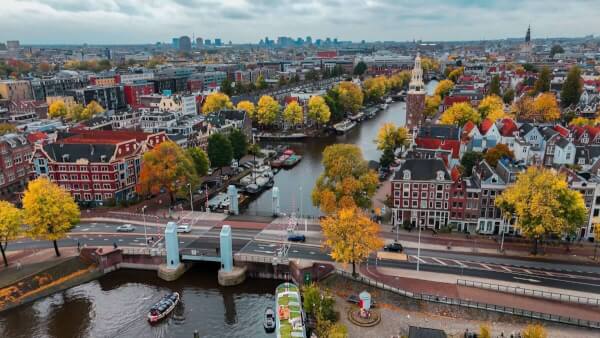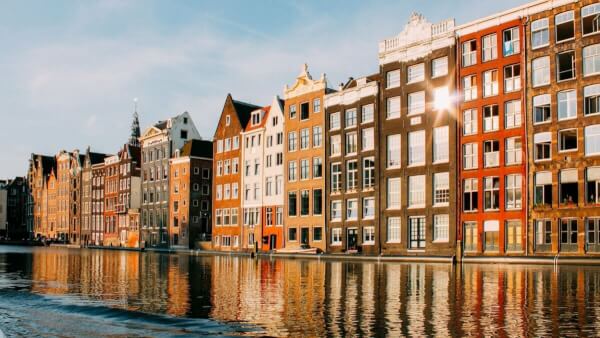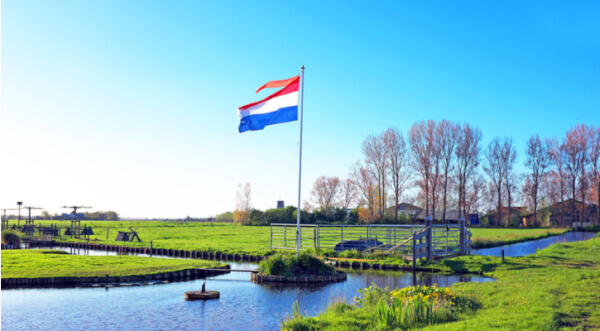Can I keep my Dutch bank account if I move abroad?
Can I keep my Dutch bank account if I move abroad? Find out everything you need to know here in our handy guide.

Moving to the Netherlands? Lucky you: it’s a friendly, laid back country with a diverse international population. It’s not always the cheapest place to live, though, and not just if you can’t stop eating stroopwafels. Here’s a look at a few ways to keep those extra euros in reserve at the beginning of your time in the Netherlands.

It’s one of those cliches that’s actually true: everyone cycles everywhere in the Netherlands. In fact, there are more bicycles in the country than people, and the average Dutch citizen cycles almost 3km per day.
Bikes aren’t the only way of getting around. Public transport is a big deal in the Netherlands: trams are everywhere, and the cities are easy to travel between by train as they are mostly close together. Although train travel in the Netherlands might not be cheap, you can buy a discount card with the Dutch railways (NS)
All of which means that your car might spend a lot of time taking up valuable space on the narrow neighbourhood streets. Is it an expense you really need? It might be better to cut your losses and go car-free.

Saving time by getting a professional to pack up all your stuff can seem tempting. But this can be a costly service, and the other downside is that unless you closely monitor what gets packed, you could end up stuck in your Amsterdam apartment with box upon box of old clothes, broken kitchen equipment and magazines you’re never going to read again.
Like it or not, moving countries means a fresh start in terms of your possessions. Take control of your stuff and sort out your move yourself - and save some cash while you’re at it.

Another problem with moving countries is how to transport fragile and bulky items. How are you going to get your chipped dining plates and mouldy bookcase to the Netherlands without spending twice what you paid for them in the first place? Here’s a radical idea: don’t.
It’s easy to sell your things online, after all, or even just to give them away to friends. And Dutch people are as keen as anyone else on second-hand goods, so you can stock up again without busting the bank. Through several websites like expatriates.com, you can even make a trade with some fellow travellers. Go on, treat yourself to a new set of plates. You’re worth it.

The Netherlands may be small, but it’s very well connected to the rest of Europe, not least because of the many tourists who pass through. So as well as the obligatory airport and train stations, Amsterdam is a major hub for international coaches. You can get to Amsterdam from just about anywhere else in Europe on a coach.
Now, it’s not a glamorous way to move, and yes, you'll need to invest in a comfy cushion. But getting the coach doesn’t just mean saving money and keeping your carbon footprint down. It also means you might well be able to take a bag or two more with you: baggage restrictions tend to be less strict than they're at airports. It’s a convenient way to reduce the hassle involved in moving all your stuff over to the Netherlands.
Convenient? The coach? Well, you know. Do get a decent book.

The Netherlands is a fantastic hub from which to travel to all sorts of exciting destinations, but your current local gym isn't among them. That’s right: it’s time to pack up your gym bag, clean out your locker, say goodbye to your favourite trainer - Brett? Steve? Too late now - and don’t forget to cancel your direct debit.
While you’re at it, make sure you don’t end up paying someone else’s utility bills, and check your magazine subscriptions and credit cards too. Make a proper list of all your regular payments - sorry for the truth bomb, but a spreadsheet is even better - and sort them all out before you move.

Even if you’re coming from elsewhere in Europe, the Netherlands is still a foreign country and therefore you will encounter a whole new set of banks, ATMs, transaction fees and so on. Opening a Dutch bank account isn't as tricky as it is in some countries, but it’s always problematic to set up a bank account before you’re a resident in a country. And there’s still the matter of transferring your money there without horrible international transaction costs.
With a borderless multi-currency account from Wise, this complex process gets a little bit simpler. Holding money in a borderless account means that you can keep it in any of the 28 supported currencies, including euros, and that you can withdraw it at any time in pounds, euros or US dollars. You get real local account details too, so you can make - and receive - Dutch payments without shelling out your bank’s international rate. And from early 2018, there will also be consumer debit cards. Even easier.

Amsterdam is notoriously expensive for property and space is tight: it’s tough if you’re on a budget or if you’re raising a family. But, as just mentioned, Dutch public transport is so straightforward that you don’t have to live in Amsterdam itself, even if you work there or want to visit often. Commuting from nearby cities is incredibly easy and may well prove much cheaper: consider Haarlem, Leiden and Hoofddorp. Utrecht, a major city in its own right, is only half an hour away by train as well.
Students often live outside the city to save cash, and families do it too, both for the same reason and to enjoy a little bit more space and greenery. So don’t count your tulips before they’ve blossomed: think about living out of town.

You’ve heard of furnished and unfurnished apartments, but a third category of housing haunts the Dutch rental market. If you get hold of a ‘shell’ apartment, it won’t even have flooring or lighting.. As an expat, this might well not be the best option - certainly not at the very beginning of your stay.
Get hold of an agent - there are many that specialise in expats - to make sure you find a new home with the level of furnishing you need. If a shell isn’t for you, there are furnished places in the Netherlands where you won’t even need to bring your own cutlery with you.

Moving with your pet to the Netherlands is straightforward so long as the requirements are met. Dogs, cats and ferrets need to be microchipped, and you should get your furry companion a pet passport. Yes, of course that’s a real document.
Your pet will fit right in in the Netherlands: it’s a country that loves its animals. Do consider pet insurance in advance of your journey, just in case anything happens.
Good luck with the big move to the Netherlands. Keep these tips in mind, and you’ll be cycling off into the Dutch sunset with enough euros in your pocket to get the best out of your new country.
*Please see terms of use and product availability for your region or visit Wise fees and pricing for the most up to date pricing and fee information.
This publication is provided for general information purposes and does not constitute legal, tax or other professional advice from Wise Payments Limited or its subsidiaries and its affiliates, and it is not intended as a substitute for obtaining advice from a financial advisor or any other professional.
We make no representations, warranties or guarantees, whether expressed or implied, that the content in the publication is accurate, complete or up to date.

Can I keep my Dutch bank account if I move abroad? Find out everything you need to know here in our handy guide.

Everything you need to know about moving to Amsterdam from the UK. Read about visas, popular expat destinations, healthcare and more.

If you’re planning a trip to the stunning city of Amsterdam, you’ll definitely want to time it right for Amsterdam Pride 2023, one of the most unique LGBTQ+...

In the Netherlands, there are more than two weeks worth of national holidays each year. But some of those holidays are more important than others, and banks...

The Netherlands is known for its universal and excellent standard of healthcare and it’s regularly rated as one of the best healthcare systems in the world....

The Netherlands attracts large numbers of expats coming to work in the global companies based in Amsterdam, and in the many diplomatic institutions around the...